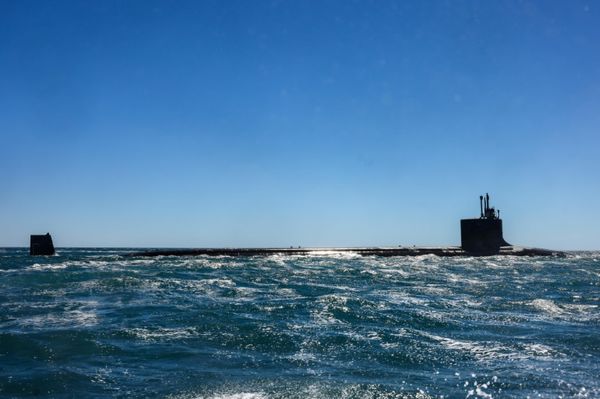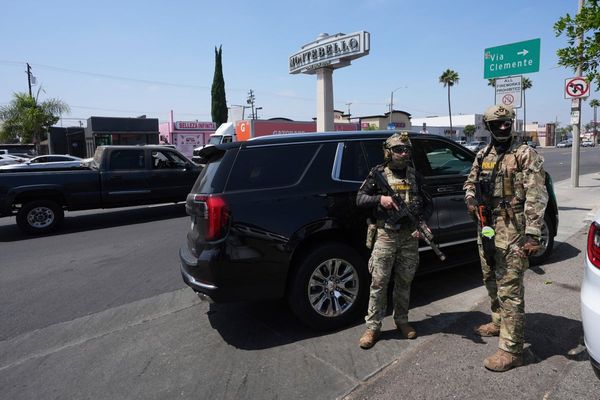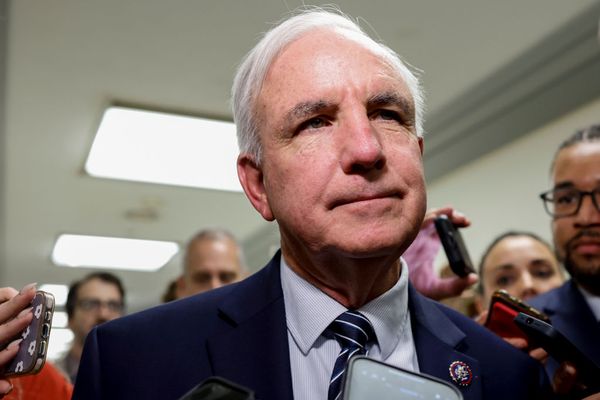WASHINGTON — Throughout his nearly 14 months in office, President Joe Biden has spoken often about the world being at “an inflection point” in a broader ideological “battle between democracies and autocracies,” vowing that the U.S. and allies are determined to deliver for those who’ve chosen freedom.
In a historic virtual address to Congress on Wednesday, Ukrainian President Volodymyr Zelenskyy tried to hold Biden to his word, pressuring him to expand U.S. aid and pleading for the North Atlantic Treaty Organization to “close the sky” over his country to stop Russia’s aerial assault.
“You are the leader of the nation. I wish you to be the leader of the world,” Zelenskyy said, addressing Biden directly, personalizing his appeal and switching to English at the end of his 15-minute presentation, which included a devastating video montage showing missiles destroying Ukrainian cities and the carnage left behind.
“To be the leader of the world means to be the leader of peace,” Zelenskyy concluded, remarking on his own willingness to die in the ongoing fight for his country’s survival. “I see no meaning in life if I can’t stop the deaths.”
Russia’s invasion of Ukraine three weeks ago has cast Biden’s frame for his presidency of “democracies versus autocracies” in new terms, no longer as ideological or abstract. And it has made clear that for all Biden’s rhetorical absolutism on the subject, the practical application of American resolve in defense of democracy has strategic limits in the face of an autocrat’s invasion and his possession of nuclear weapons that could be turned against the West.
Zelenskyy, defiant in the face of his capital’s bombardment by Russian missiles and bombs, has already become an iconic freedom fighter, inspiring a surge of global support for his country that has compelled long-reluctant leaders across the West to rethink their commitments to defense spending and reaffirm heretofore fraying alliances.
But his appeals have made only moderate headway with Biden, a seasoned foreign policy hand who is determined to respond with diplomacy and economic sanctions to Russian President Vladimir Putin’s unprovoked and unrelenting deployment of tanks, bombs and missiles. Biden has ruled out sending American troops to fight in Ukraine and is wary of moves that might draw the U.S. and NATO allies into direct conflict with Russia.
Zelenskyy, whose dexterity with social media has made his country’s cause resonate across the global village, seemed aware that his primary request for a no-fly zone was unlikely, offering Washington additional steps it could take to help his country.
“In the darkest time for our country, for the whole Europe, I call to you to do more,” he said.
Zelenskyy asked the U.S. to expedite the delivery of fighter jets and more weapons. But he also laid out additional steps Washington could take to further squeeze Russia economically: closing ports to Russian shipping, sanctioning many more Russian politicians and demanding that all U.S. companies leave Russia.
“Peace,” he said, “is more important than income.”
Biden has mostly held firm in the face of Zelenskyy’s emotional pleas, refusing to institute a no-fly zone over Ukraine that he believes would effectively engage the U.S. and NATO in a military conflict with Russia. He also scotched a proposal by Poland to help deliver to Ukraine’s military a fleet of Soviet-era MiG-29 fighter jets that Zelenskyy and other Ukrainian officials have clamored for.
Zelenskyy’s plea for help to “close the sky” is likely to ratchet up calls from Capitol Hill for the administration to find a way to bolster Ukraine’s air defense, although a majority of lawmakers appear to share Biden’s opposition to imposing a no-fly zone.
Biden, whose approval rating is roughly 20 points lower than Zelenskyy’s, has not been wholly impervious to political pressures related to Ukraine. Despite a concerted effort to move in lockstep with NATO allies, Biden acted unilaterally last week to ban Russian oil and gas imports after it became clear that a bipartisan majority in Congress was advancing legislation that would have forced his hand on that issue.
At the White House just hours after Zelenskyy’s address, the president officially signed bipartisan legislation authorizing another $800 million in additional security aid for Ukraine. Calling Zelenskyy’s remarks “compelling” and embracing his cause, Biden’s prompt response and brief comments underscoring the U.S. commitment to Ukraine underlined the seriousness with which the White House views the crisis and the power of Zelenskyy’s pleas. They also represented a determination by the White House to deflate any additional political pressure Zelenskyy’s address might create.
Biden said the new tranche of weapons would include much of what Zelenskyy sought: Stinger anti-aircraft systems, shoulder-to-surface Javelin missiles, guns, grenades, ammunition and advanced drones, which made clear, Biden said, the U.S. “commitment to sending our most cutting-edge systems.”
While the administration has said it understands why Ukraine is calling on the West to do more, officials have sought to highlight Biden’s work in unifying NATO behind a sanctions package that has devastated Russia’s economy, its delivery of weapons systems and conveyance of real-time intelligence that has enabled Ukraine’s military to combat Putin’s onslaught.
Ian Bremmer, president of the Eurasia Group, praised the White House for communicating clearly throughout the crisis, providing accurate intelligence assessments and keeping the NATO alliance and Congress largely unified behind Ukraine.
“You have to give the administration high marks for this, but that doesn’t mean they’re going to succeed,” Bremmer said. “Russia’s economy will collapse, but that doesn’t mean Putin’s going to do what you want him to do.”
Zelenskyy’s repeated calls for a no-fly zone, he continued, could open up new political divides over the conflict in Ukraine, a rare issue that has largely unified Democrats and Republicans.
Eric Edelman, a former ambassador to Finland and Turkey who served as undersecretary of defense under President George W. Bush, questioned the White House’s logic in determining that delivering MiG-29 jets could be deemed by Putin as escalatory when it continues to supply Javelin missiles and other weapons that are being used against Russian forces. The Biden administration rebuffed Poland’s efforts last week to transfer such jets to Ukraine.
“All of it is potentially escalatory,” Edelman said. “I wish they would stop worrying about what’s going to provoke Putin and start making Putin worry about what’s going to provoke the U.S. and NATO.”
The president and other administration officials have been explicit about the fear of setting off “World War III” through any direct military engagement with another nuclear power, seeming to take Putin’s threats of deploying nuclear weapons seriously.
“It costs Putin nothing to saber-rattle about nuclear weapons, but if he uses them, it costs him everything,” Edelman said. “But if you allow him to play that card and cow you, there’s no end to it. And ultimately you will find yourself in a much more serious crisis.”
After announcing the aid package, Biden declined to take questions from reporters, including one about whether the U.S. would supply the MiG-29s that Zelenskyy has requested. But he closed his prepared remarks by again framing the battle in Ukraine, which he said could go on for a long time, in familiar terms as “a struggle that pits the appetites of an autocrat against humankind’s desire to be free.”
“Let there be no doubt, no uncertainty, no question — America stands with the forces of freedom,” he continued. “We always have and we always will.”
———







